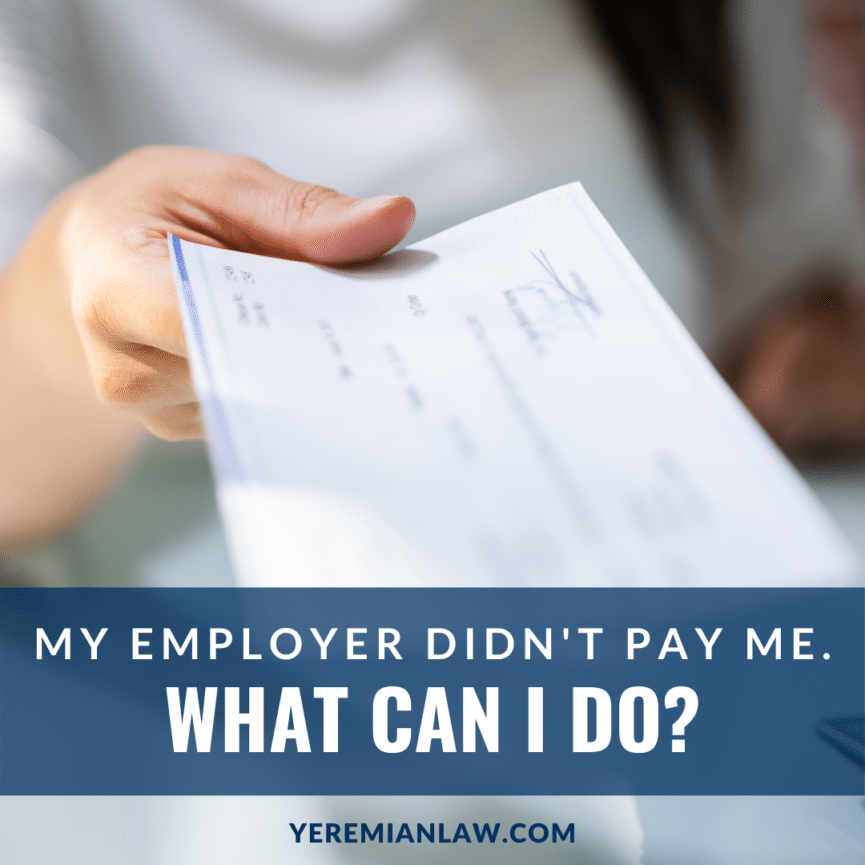Workers in California have rights – including the right to be paid a fair wage for work. But if you’re like many people, you’re in a tough spot: Your employer hasn’t paid you what you’re owed, and you need to know what to do.
My Employer Didn’t Pay Me – What Can I Do?
Many people come to us and say, “My employer didn’t pay me. What can I do?” The bottom line is that you have the right to be paid on a regular payday – and if you’re voluntarily leaving the company, you have the right to receive your paycheck within 72 hours of quitting. If you’re fired, you must be paid on the same day you’re fired.
This guide addresses:
- Scheduled paydays and being paid in a timely manner
- Your final paycheck after quitting a job
- Your final paycheck after being fired from a job
Scheduled Paydays and Being Paid in a Timely Manner
Under California law, most people must be paid at least twice per month. Employers can pay you more frequently – but generally, they can’t pay you less frequently. Additionally, employers have to pay workers on a regular payday. It’s not okay for an employer to change payday all the time (such as by saying, “We’ll pay you next time we get paid by this customer”). The law also dictates how long your employer is allowed to make you wait to be paid for work you’ve already performed:
- If your employer pays you twice a month, it must give you the wages you earned between the 1st and 15th by the 26th of that month. It must give you the wages you earned between the 16th and the last day of the month by the 10th of the next month. That means your paycheck for that pay period must be in your hands (or your bank account) on or before the 26th or the 10th of the month; otherwise, your employer is violating the law.
- If you’re paid weekly, or if your employer pays you for pay periods that don’t go from the 1st to the 15th and the 16th through the end of the month, it must pay you within 7 days of the end of the payroll period.
Your Final Paycheck After Quitting a Job
You have the right to quit your job at any time in California, and if you exercise that right with at least 72 hours’ notice, your employer must be paid all your wages on the day you leave your employer. Your employer has to pay you all your accrued vacation time, as well.
If you quit without giving 72 hours’ notice, your employer has to give you your final wages within 72 hours of the time you quit.
Related: California’s final paycheck law
Your Final Paycheck After Being Fired From a Job
If your employer fires you, it must give you your final paycheck immediately. That includes your accrued vacation time.
What Happens if Your Employer Misses Payment Deadlines?
If your employer misses payment deadlines, the company is subject to waiting time penalties. A waiting time penalty is an amount equal to your daily rate of pay for each day the wages remain unpaid – up to a maximum of 30 days. That means if you make $100 per day and your employer is 30 days late, the company may actually owe you your final paycheck plus $3,000.
What About Unpaid Commissions?
If you earn commissions by selling a product or service, your employer is supposed to pay you what it owes you. Commissions are considered wages in most cases.
Related: What are unpaid commissions?
Can Your Employer Direct-Deposit Your Final Paycheck?
Your employer can direct-deposit your final paycheck only if you’ve previously authorized direct deposit for those wages.
Do You Need to Talk to an Attorney About Your Employer Failing to Pay You?
If your employer didn’t pay you and you need to know what you can do, we may be able to help. Call us for a free consultation – we’re at 818-230-8380. If it’s easier, you can fill out the form below and we’ll be in touch.




